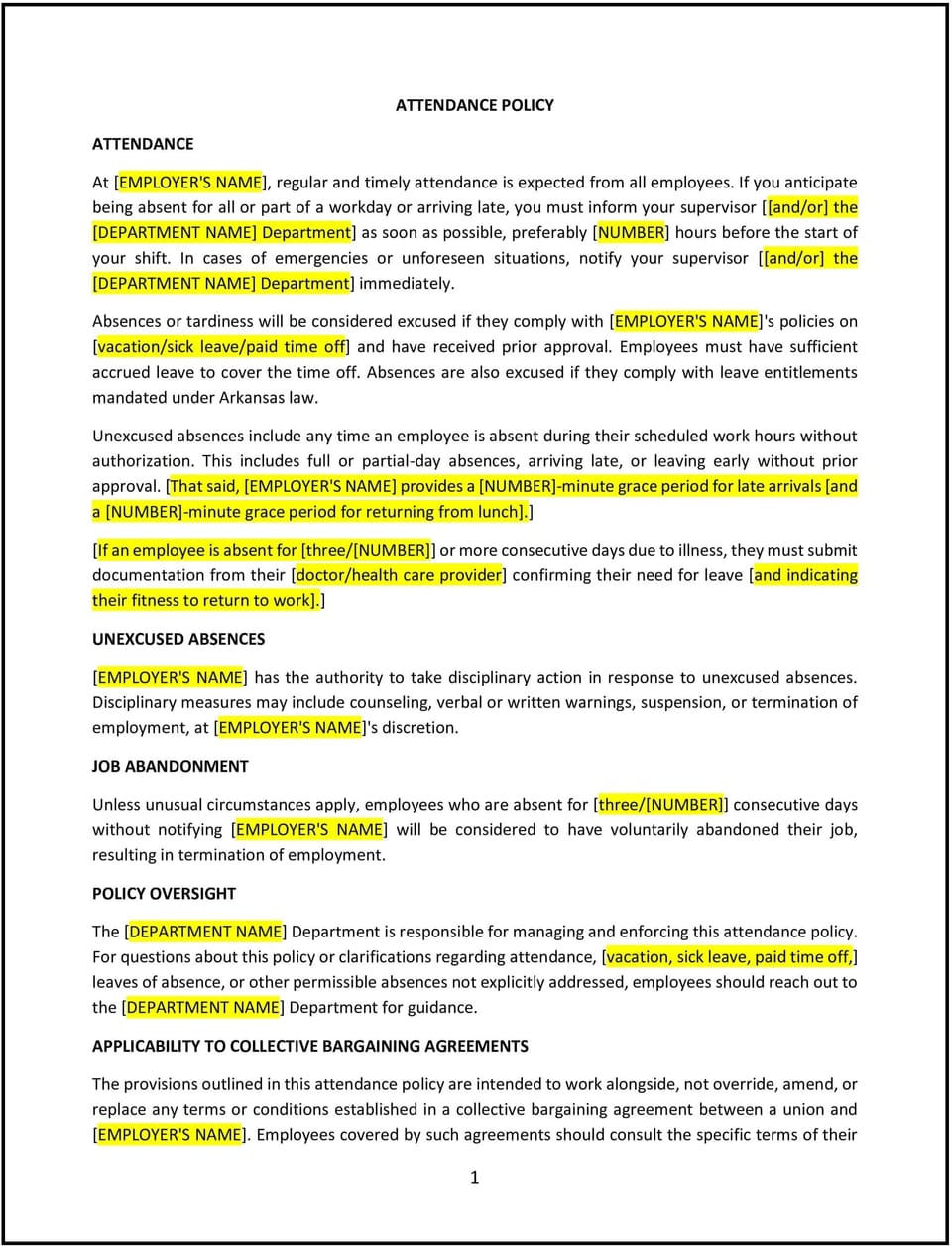Attendance policy (Arkansas): Free template

Attendance policy (Arkansas)
In Arkansas, an attendance policy provides businesses with clear guidelines for employee attendance, punctuality, and absence management. This policy helps businesses ensure operational efficiency, promote fairness, and support compliance with state and federal labor laws regarding time off and workplace flexibility.
This policy outlines acceptable attendance practices, procedures for reporting absences, and the consequences of attendance violations. By implementing this policy, Arkansas businesses can improve accountability and maintain productivity while accommodating legitimate employee needs.
How to use this attendance policy (Arkansas)
- Define attendance expectations: Clearly communicate expectations regarding punctuality, work hours, and reporting absences, ensuring employees understand their responsibilities.
- Establish reporting procedures: Provide a straightforward process for employees to notify supervisors of absences or tardiness, including timelines and required documentation.
- Address state-specific considerations: Incorporate provisions for Arkansas-specific leave requirements, such as family leave, medical leave, or jury duty.
- Set consequences for violations: Outline the steps the business will take in response to unexcused absences, repeated tardiness, or failure to follow reporting procedures, such as warnings or disciplinary actions.
- Offer flexibility when appropriate: Include options for accommodating employees facing unexpected challenges, such as medical emergencies, while maintaining operational needs.
Benefits of using this attendance policy (Arkansas)
This policy offers several advantages for Arkansas businesses:
- Improves operational efficiency: Ensures teams operate smoothly by maintaining consistent attendance and minimizing disruptions from absenteeism.
- Supports compliance: Aligns with Arkansas and federal labor laws, including those related to time off, ensuring the business supports employee rights while maintaining efficiency.
- Enhances employee accountability: Promotes a culture of responsibility, encouraging employees to adhere to attendance expectations and communicate effectively about absences.
- Reduces conflicts: Provides a fair and transparent framework for addressing attendance issues, reducing misunderstandings and workplace tensions.
- Protects business interests: By managing attendance effectively, the business can maintain productivity and meet customer or client needs without interruptions.
Tips for using this attendance policy (Arkansas)
- Address Arkansas-specific considerations: Ensure the policy incorporates any state-specific leave laws or requirements, such as jury duty or medical leave protections.
- Train managers: Provide training to supervisors on enforcing the policy consistently, handling absence requests, and addressing attendance issues appropriately.
- Monitor attendance: Use attendance tracking systems to identify patterns, address issues early, and maintain accurate records for compliance and planning.
- Communicate policy updates: Notify employees of any changes to the policy to ensure they remain informed of expectations and procedures.
- Review regularly: Evaluate the policy periodically to ensure it aligns with current business needs, employee expectations, and legal requirements.
Q: How does this policy benefit the business?
A: This policy helps the business maintain productivity, support compliance with Arkansas labor laws, and reduce disruptions by providing clear attendance guidelines and procedures.
Q: How should the business handle repeated attendance violations?
A: The business should follow a structured process, including documented warnings, performance discussions, and, if necessary, disciplinary actions to address attendance issues fairly and consistently.
Q: How does this policy support compliance with Arkansas laws?
A: The policy includes provisions for state-specific leave requirements, such as jury duty and medical leave, ensuring the business meets its legal obligations while maintaining operational efficiency.
Q: What tools can the business use to monitor attendance?
A: The business can use time tracking software, attendance logs, or other systems to maintain accurate records, identify patterns, and address issues proactively.
Q: How can the business ensure fairness in applying this policy?
A: The business can ensure fairness by training managers to apply the policy consistently, maintaining open communication with employees, and addressing individual circumstances within the framework of the policy.
This article contains general legal information and does not contain legal advice. Cobrief is not a law firm or a substitute for an attorney or law firm. The law is complex and changes often. For legal advice, please ask a lawyer.


